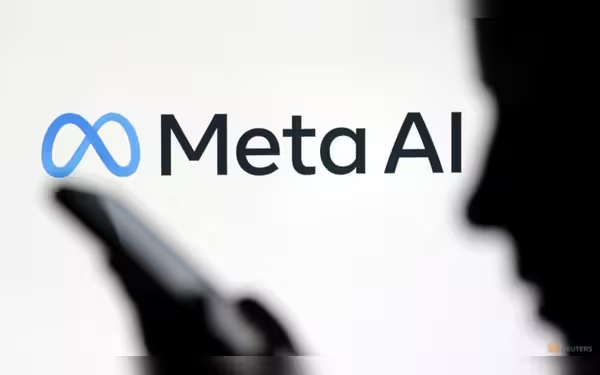Thursday, November 7, 2024 08:48 AM
Meta Unveils Self-Taught Evaluator AI Model for Autonomous Assessment
- Meta introduces Self-Taught Evaluator for AI model assessment.
- AI-generated data eliminates human involvement in training.
- Future of self-improving AI agents looks promising.
 Image Credits: channelnewsasia
Image Credits: channelnewsasiaMeta has launched the Self-Taught Evaluator, an AI model that autonomously assesses other AI models, revolutionizing AI development.
In a significant advancement in artificial intelligence, Meta, the parent company of Facebook, has announced the release of several new AI models from its research division. Among these is a groundbreaking tool known as the "Self-Taught Evaluator." This innovative model aims to reduce the need for human involvement in the AI development process, marking a pivotal shift in how AI systems are created and assessed.
The introduction of the "Self-Taught Evaluator" follows a detailed explanation provided in an August research paper. This model utilizes a technique called "chain of thought," similar to the methods employed by OpenAI's recently launched models. Essentially, this technique breaks down complex problems into smaller, manageable steps, which enhances the accuracy of responses in challenging subjects such as science, coding, and mathematics.
What sets this evaluator apart is its training process, which relies entirely on AI-generated data. By eliminating human input during this stage, Meta's researchers have paved the way for a more autonomous evaluation process. This capability to have AI assess AI could lead to the development of autonomous AI agents that learn from their own mistakes, as explained by two of the researchers involved in the project.
Many experts in the AI field envision a future where these intelligent agents can perform a wide range of tasks without any human intervention. The potential for self-improving models is particularly exciting, as it could replace the current, often costly, method known as Reinforcement Learning from Human Feedback. This traditional approach requires human annotators with specialized skills to accurately label data and verify complex answers.
Jason Weston, one of the researchers, expressed optimism about the future of AI, stating, "We hope, as AI becomes more and more super-human, that it will get better and better at checking its work, so that it will actually be better than the average human." He emphasized that the ability to be self-taught and self-evaluating is crucial for achieving a super-human level of AI.
While Meta is making strides in this area, other companies like Google and Anthropic are also exploring similar concepts, particularly Reinforcement Learning from AI Feedback (RLAIF). However, unlike Meta, these companies typically do not release their models for public use.
In addition to the "Self-Taught Evaluator," Meta has also unveiled updates to its image-identification tool, the Segment Anything model, and introduced a tool that accelerates response generation times for large language models (LLMs). Furthermore, new datasets have been released to assist in the discovery of new inorganic materials.
As AI technology continues to evolve, the implications of these advancements are profound. The ability for AI to evaluate its own work not only streamlines the development process but also opens the door to a future where machines can operate with greater independence and efficiency. This could lead to a new era of digital assistants capable of handling complex tasks, ultimately transforming the way we interact with technology.













